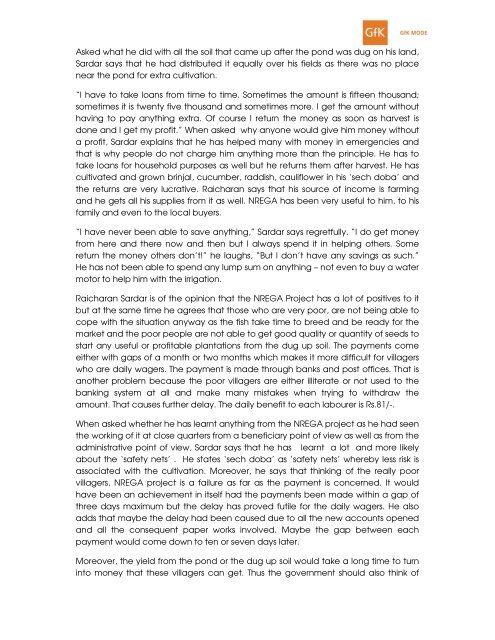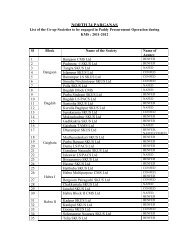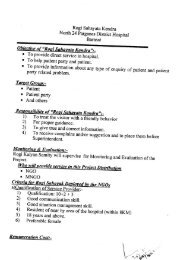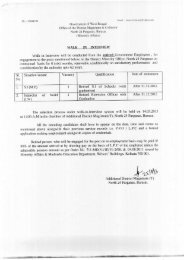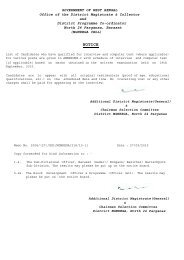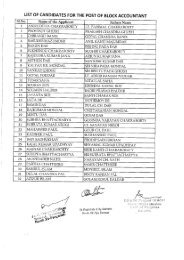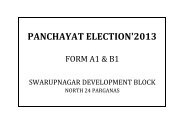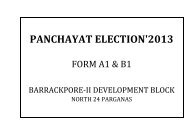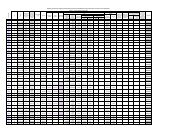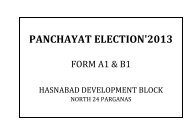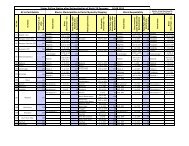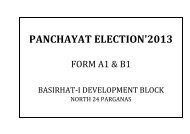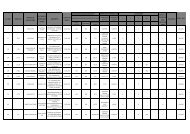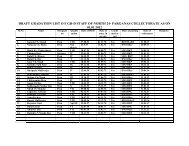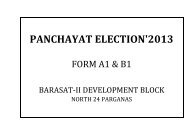Create successful ePaper yourself
Turn your PDF publications into a flip-book with our unique Google optimized e-Paper software.
Asked what he did with all the soil that came up after the pond was dug on his land,Sardar says that he had distributed it equally over his fields as there was no placenear the pond for extra cultivation.“I have to take loans from time to time. Sometimes the amount is fifteen thousand;sometimes it is twenty five thousand and sometimes more. I get the amount withouthaving to pay anything extra. Of course I return the money as soon as harvest isdone and I get my profit.” When asked why anyone would give him money withouta profit, Sardar explains that he has helped many with money in emergencies andthat is why people do not charge him anything more than the principle. He has totake loans for household purposes as well but he returns them after harvest. He hascultivated and grown brinjal, cucumber, raddish, cauliflower in his ‘sech doba’ andthe returns are very lucrative. Raicharan says that his source of income is farmingand he gets all his supplies from it as well. NREGA has been very useful to him, to hisfamily and even to the local buyers.“I have never been able to save anything,” Sardar says regretfully. “I do get moneyfrom here and there now and then but I always spend it in helping others. Somereturn the money others don’t!” he laughs, “But I don’t have any savings as such.”He has not been able to spend any lump sum on anything – not even to buy a watermotor to help him with the irrigation.Raicharan Sardar is of the opinion that the NREGA Project has a lot of positives to itbut at the same time he agrees that those who are very poor, are not being able tocope with the situation anyway as the fish take time to breed and be ready for themarket and the poor people are not able to get good quality or quantity of seeds tostart any useful or profitable plantations from the dug up soil. <strong>The</strong> payments comeeither with gaps of a month or two months which makes it more difficult for villagerswho are daily wagers. <strong>The</strong> payment is made through banks and post offices. That isanother problem because the poor villagers are either illiterate or not used to thebanking system at all and make many mistakes when trying to withdraw theamount. That causes further delay. <strong>The</strong> daily benefit to each labourer is Rs.81/-.When asked whether he has learnt anything from the NREGA project as he had seenthe working of it at close quarters from a beneficiary point of view as well as from theadministrative point of view, Sardar says that he has learnt a lot and more likelyabout the ‘safety nets’ . He states ‘sech doba’ as ‘safety nets’ whereby less risk isassociated with the cultivation. Moreover, he says that thinking of the really poorvillagers, NREGA project is a failure as far as the payment is concerned. It wouldhave been an achievement in itself had the payments been made within a gap ofthree days maximum but the delay has proved futile for the daily wagers. He alsoadds that maybe the delay had been caused due to all the new accounts openedand all the consequent paper works involved. Maybe the gap between eachpayment would come down to ten or seven days later.Moreover, the yield from the pond or the dug up soil would take a long time to turninto money that these villagers can get. Thus the government should also think of


